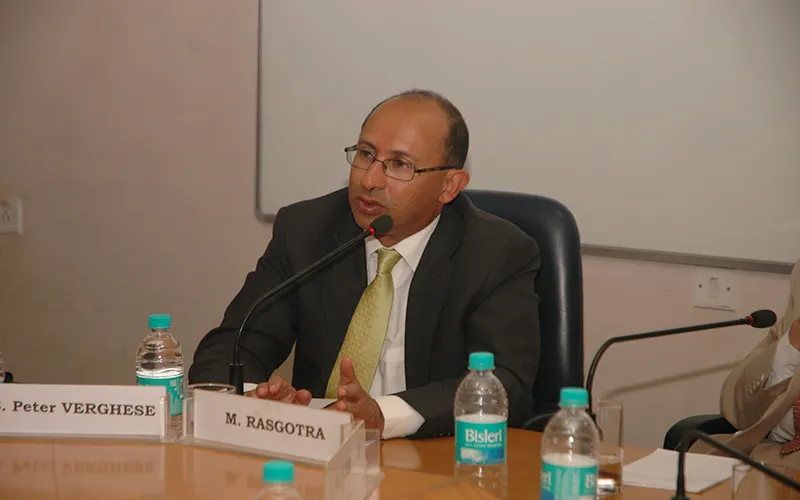With interests of Australia and India "converging" in the evolving geostrategic environment of Asia, both countries have the capacity to develop into a "real" strategic partnership, according to the Australian High Commissioner, Mr Peter Varghese.

Australia-India relations have all the ingredients to develop into a "real" strategic partnership, noted Mr Peter Varghese, the Australian High Commissioner, while delivering a talk on "Australia-India Strategic Partnership in an Asian Century" at the Observer Research Foundation on 3 May, 2012. He pointed out that interests of the two countries are "converging" in the evolving geostrategic environment of Asia and this is providing an "opportunity" to build a strategic partnership.
Mr. Varghese discussed Australia-India relations in the broader regional geostrategic framework of "the Indo-Pacific" region and outlined the strategic rationale for Australia and India partnership and how to actually build that partnership. He noted that India has been increasingly playing an important role in the security of Asia and its growing "strategic influence" in the Indo-Pacific region has seen its return to Asia’s "strategic matrix". India’s geographical location connecting the Indian and Pacific Oceans also underlines the "crucial role" it will play in the maritime environment and this is "likely" to impact Australian future strategic and defence planning, he observed. The Indo-Pacific region is confronted with several immense challenges and these problems only "reinforces India’s role as a strategic partner" for Australia, he added.
The East Asian Summit (EAS), where both India and Australia are members, has emerged as the premier regional institution in addressing both the strategic and economic challenges facing the Indo-Pacific region, Mr. Varghese noted. He pointed out that Canberra views New Delhi as a "partner" in the EAS in ensuring that regional financial and economic integration keeps moving forward; in nurturing a culture of dialogue and collaboration on security issues and in addressing transnational issues such as climate change, resource and food security, non-proliferation and terrorism. While the "primary burden of managing strategic stability" in Asia will fall on bilateral relationships, regional institutions can play "an important complementary role" and the effort should be towards "refining and strengthening regional structures in ways which reinforce stability and prosperity," he noted.
Australian interests are best served by "a stable balance of power" in Asia which favours open societies, encourages economic integration and is inclusive in membership and looks outward, Mr. Varghese observed. India along with other Australian partners (the US, Japan, Korea, Indonesia) has been securing these objectives with Australia and shares both interests and values with these countries, he pointed out. Australia and India’s views on most of these issues are "remarkably close" and the way in which thier strategic policy is developing also has much "common ground", he noted. Both India and Australia want an Asian region which is "outward-looking and inclusive"; regional institutions which will help manage major power tensions; prefer the US as "a stabilising force" in the world, though from admittedly different perspectives, he pointed out.
Mr. Varghese noted that the "solid" basis of India-Australia strategic partnership comes from the "shared interests as Indian Ocean states in the stability of the Indian Ocean region" and focus on "the importance of the maritime theatre to the security challenges of the future and our shared values as liberal democracies." He emphasised that Australia’s approach in building the strategic partnership with India is to do so "step by step" keeping in mind that India’s strategic interests in the region are still at "a formative stage". He further noted that the "key" to building the Australia-India relationship is "patience and realistic expectations." India’s changing sense of its strategic interests will bring it closer to Australia, notwithstanding the limits to how far and how fast India will want to go in this direction, he added.
Australia will focus on a "four pillar strategy" in its relations with India, he pointed out. First, an economic relationship built around energy security which will reframe the way India thinks about Australia; second, a political/strategic relationship based on closer defence cooperation, a closer working relationship on institution-building in Asia and the Indian Ocean through the East Asia Summit and the Indian Ocean Rim Association for Regional Cooperation; third, a multilateral strategy focussed on the G20 with closer collaboration on trade liberalisation and climate change; and finally building the people-to-people relationship in a way which reinforces their shared interests.
He pointed out that India’s current strategic trajectory does not run against "core" Australian strategic interests thereby providing the basis for a strategic partnership between the two countries. He, however, pointed out that the India-Australia strategic partnership will be "less than an alliance" driven by a broadly shared view of the drivers of stability in Asia, including an inclusive and outward-looking regionalism. He concluded with the observation that India and Australia have in place "the key elements" of a strategic partnership and that he is optimistic about the Australia-India relationship. The talk was followed by a discussion in which several diplomats, scholars, and journalists participated.
(This report is prepared by K. Yhome, Research Fellow at Observer Research Foundation)
The views expressed above belong to the author(s). ORF research and analyses now available on Telegram! Click here to access our curated content — blogs, longforms and interviews.




 PREV
PREV

